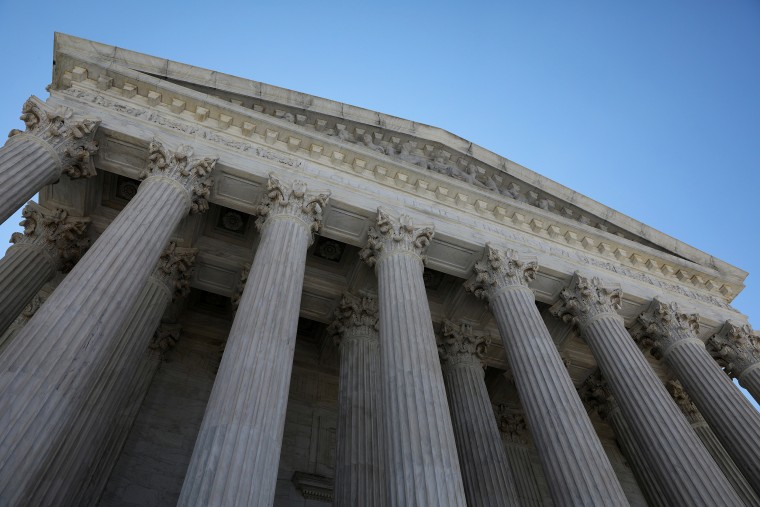After Justice Antonin Scalia died in February 2016, Senate Republicans said the United States was in the middle of a presidential election, so the Supreme Court vacancy would have to go unfilled. To be sure, Election Day was still nine months away, but for GOP senators in 2016, that was simply too close for the chamber to even consider a high court nominee.
President Barack Obama chose Judge Merrick Garland for the bench -- a compromise choice who'd already been endorsed by then-Sen. Orrin Hatch (R-Utah) -- but Senate Republicans refused to even extend him the courtesy of a hearing.
"Let voters decide," the GOP declared at the time.
Four years later, there is no current Supreme Court vacancy, but the mere possibility has left many Senate Republicans salivating at the prospect of moving the high court even further to the far-right. Election Day 2020 is exactly three months from today, but there's no shortage of GOP senators -- Kentucky's Mitch McConnell, Iowa's Joni Ernst, South Dakota's John Thune, South Carolina's Lindsey Graham, et al. -- insisting that they'd fill a vacancy this year anyway.
It's the opposite of what they said four years ago. It's at odds with any sense of honor. Republicans have made no secret of the fact that they simply don't care.
It's led some Senate Democrats to open doors that were previously closed. Take Sen. Tim Kaine (D-Va.), for example.
Democrats are warning Republicans not to fill a possible Supreme Court vacancy this year after denying President Barack Obama the chance in 2016, saying it would embolden a push on the left to add seats to the court whenever they regain power.... Kaine, the party's last vice presidential nominee and a lawmaker with a reputation as an institutionalist, said confirming a nominee of President Donald Trump this year could compel Democrats to consider adding seats to the high court.
"If they show that they're unwilling to respect precedent, rules and history, then they can't feign surprise when others talk about using a statutory option that we have that's fully constitutional in our availability," Kaine told NBC News. "I don't want to do that. But if they act in such a way, they may push it to an inevitability. So they need to be careful about that."
The same report added that Sen. Mazie Hirono (D-Hawaii), a member of the Senate Judiciary Committee, acknowledged that she's been "talking with people who have different ideas about what we can do." Among those ideas are "adding to the court."
At issue is something popularly known as "court packing." In practice, the idea is for Congress to expand the number of seats on the Supreme Court as part of an overtly political effort to alter the bench's ideological makeup.
It is, to be sure, a radical step -- but arguably no more radical than Republicans effectively stealing a seat in 2016, and then planning to abandon their own stated principles to further hijack the high court in 2020.
Indeed, the fact that Tim Kaine, of all people, is broaching the subject is striking, largely because of his relative moderation. If the Virginian is open to this possibility, it helps capture just how furious Democrats are about the possibility of GOP senators trying to fill a vacancy this year.
I won't pretend to know what will happen in the coming months, or whether there will even be a vacancy. Circling back to some of our earlier coverage, I will note, however, that it'd be a mistake to see court packing as wholly at odds with the American tradition.
The New Republic published a piece a while back noting what transpired after the presidential election of 1800: "The outgoing Federalist Party ... reduced the size of the Court from six to five to keep Jefferson from filling an anticipated vacancy. Once Jefferson's Democratic-Republican Party was firmly in power, they increased the size back to six justices, then to seven, to allow Jefferson to appoint new justices."
More than a half-century later, ahead of the Civil War, Abraham Lincoln and congressional Republicans expanded the Supreme Court to 10 justices in order to help protect the White House's agenda.
Similar plans didn't go well when FDR tried a similar gambit in the 1930s, but let's not pretend contemporary chatter about this in Democratic circles is wholly without historical precedent.
Postscript: While Republican leaders have made it clear that they would try to fill a Supreme Court vacancy this year, no matter what, not every GOP senator is on board with such a plan. Sen. Lisa Murkowski (R-Alaska), for example, said, "When Republicans held off Merrick Garland it was because nine months prior to the election was too close, we needed to let people decide. And I agreed to do that. If we now say that months prior to the election is OK when nine months was not, that is a double standard and I don't believe we should do it. So I would not support it."
Sen. Chuck Grassley (R-Iowa) -- who blocked Merrick Garland in 2016 during the Iowan's tenure as chairman of the Judiciary Committee -- has made similar comments, suggesting he's uncomfortable with filling a vacancy this year, but whether Grassley will stick to that if/when the pressure's on is unclear.

